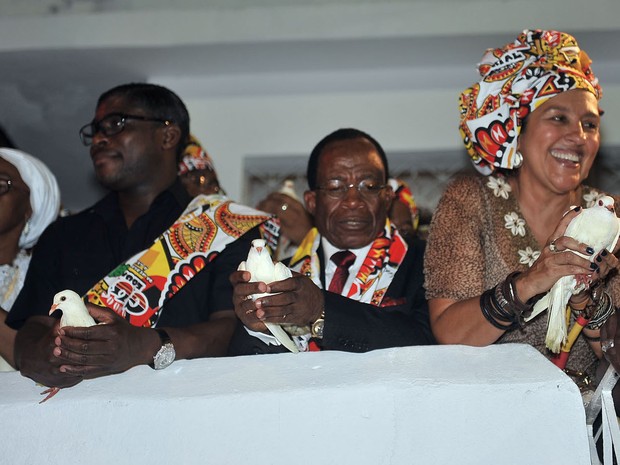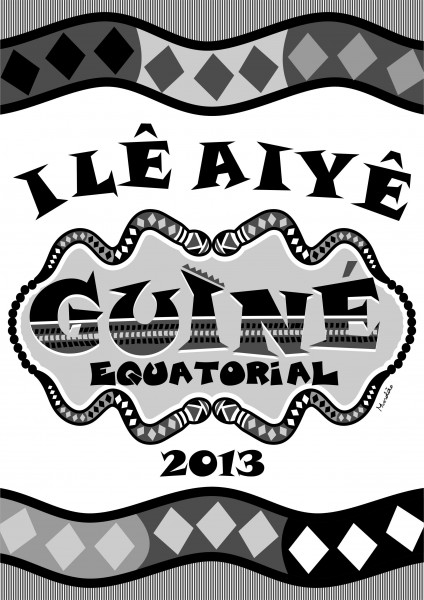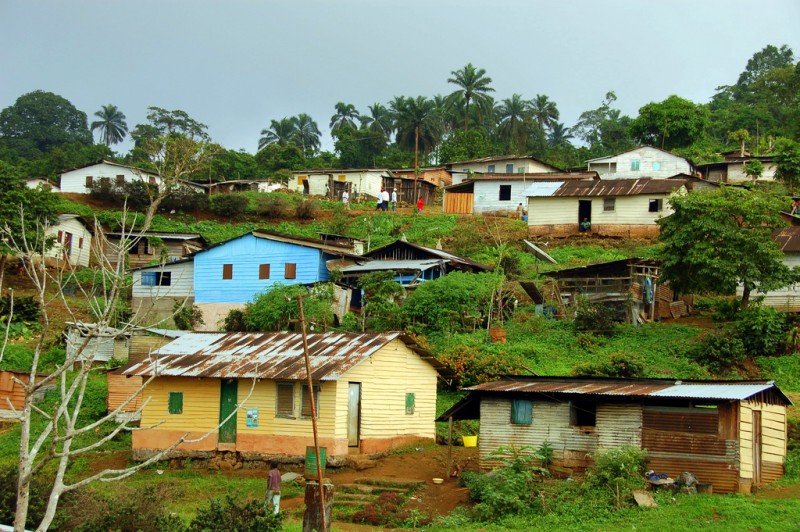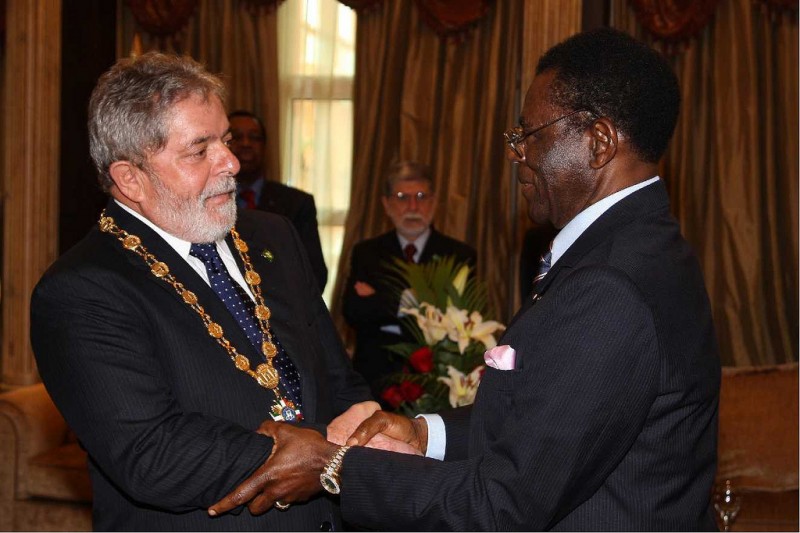
Samba School Beija-Flor parades in this year's carnival in Rio amid allegations it received funding from an African dictatorship. Image by Marcelo Fonseca. Copyright Demotix
Brazil's press and social media have been in a frenzy the past week after Beija-Flor samba school was crowned champion of Rio de Janeiro's Carnival amid allegations it received funding from Equatorial Guinea's dictatorship government.
The samba school Beija-Flor de Nilóponis went on parade at the Sapucaí Sambódromo on February 15 with the theme “A griot tells the story: a look at Africa and the rise of Equatorial Guinea. May we walk the trail of our happiness”, only days after newspaper O Globo reported it had received 3.5 million euros (about 4 million US dollars) from Equatorial Guinea's President Teodoro Obiang Nguema Mbasogo. Though the story didn't mention any sources, it was enough to resonate worldwide.
What followed was a series of conflicting reports. First, Beija-Flor artistic director Fran Sérgio Oliveira told reporters that no money came from Equatorial Guinea's government, but rather from Brazilian contractors who currently have business in the African country. Among them, Odebrecht, Queiroz Galvão and Andrade Gutierrez – all of them currently under investigation for their role in a corruption scheme involving state-run oil company Petrobras.
He also added that Equatorial Guinea's people “are happy with the president”:
O governo da Guiné não nos deu dinheiro, e sim apoio cultural. Eles nos cederam livros, fotos e outros materiais. É um povo (da Guiné) que sofreu muito e que, através do seu presidente, está construindo um país novo, que pensa em saúde, infraestrutura, saneamento básico. O povo é superfeliz com isso, então não importa o regime.
Guiné's government didn't give us money, just cultural support. They gave us books, photos and other materials. They are a people who have suffered a lot and, through their president, are building a new country, that thinks about health, infrastructure and sanitation. The people are super happy with that, so the regime doesn't matter.
This version was first confirmed by Equatorial Guinea government in an official statement issued on February 19. The statement, signed by Information Minister Teobaldo Nchaso Matomba, says:
A iniciativa da homenagem não partiu do governo da Guiné Equatorial, nem da presidência. Trata-se de uma iniciativa que surgiu das empresas brasileiras que operam na Guiné Equatorial, conjuntamente com a Beija-Flor.
The homage initiative didn't come from the government of Equatorial Guinea, nor from its presidency. It's an initiative that came from Brazilian companies that have businesses in Equatorial Guinea, together with Beija Flor.
Odebrecht quickly denied it funded Beija Flor's parade, saying it have never had any contracts in Equatorial Guinea. According to O Globo, the other mentioned companies didn't comment.
In the same day, however, ambassador for Equatorial Guinea to Brazil Benigno Pedro Matute Tang gave another version of the facts, contradicting his own government's official statement. He told newspaper O Estado de S. Paulo that about 30 companies from Equatorial Guinea did some sort of crowdfunding for Beija-Flor's parade, raising a total amount of between 4 and 5 million reais (1.3 and 1.6 million dollars). He explained:
Foram financiadores culturais. Um deu 50 euros, outro deu 100 euros. Não temos como saber quanto cada um deu, o valor exato. O governo não tem nada a ver com isso. Somente pessoas do meio cultural. O que a imprensa divulgou é uma soma muito excessiva. Se quiserem, podemos verificar e fazer a estimativa em detalhes em vez de falar no ar.
It was a cultural funding. One gave 50 euros, the other 100 euros. We have no way to know how much each of them gave, the exact value. The government has nothing to do with that. It was only people from the culture business. The sum quoted by the press is very exaggerated. If you people want, we can verify and make the estimate in details instead of just speaking off the cuff.
In the end, Brazil's Federal Public Prosecutor's Office announced it will investigate the alleged donation.
Meanwhile, “Beija-Flor” was a trending topic worldwide on Twitter on February 19. Brazilians did not miss the opportunity to crack jokes:
ABRE ALAS que lá vem Beija-Flor 2016, minha gente pic.twitter.com/ezUENMJGQp
— Thiago Romariz (@thiagoromariz) February 18, 2015
MAKE WAY, people, Beija Flor 2016 is coming.
But others were critical:
Alô, Guiné Equatorial! Se não quiser ver sua sujeira exposta nos jornais, da próxima vez não invista na Beija-Flor. Mas no HSBC.
— Bruno Torturra (@torturra) February 19, 2015
Hey, Equatorial Guinea! If you don't want your dirt exposed in the newspapers, next time don't put your money on Beija Flor. But on HSBC instead. [This is a reference to the fact that Brazilian media is yet to publish a single story on the Swiss leaks, despite the revelation that some prominent Brazilian businessmen and politicians have money there].
On Facebook, activist group Coletivo Projetação posted a video of their “Dictator on the walkway” protest, in which they had projected messages condemning Obiang on a building wall while Beija-Flor paraded in Rio.
The prodigal son's love for Brazil
Obiang, who came to rule in 1979 in a bloody coup, is accused of a litany of human rights abuses. The country has Africa's highest GDP per capta (37,900 dollars), yet 77 percent of the population falls below the poverty line, 35 percent die before the age of 40, and 58 percent lack access to safe water, according NGO Global Witness.
The wealthy head of state is on the list of “Predators of Freedom of Information”, published by Reporters Without Borders in 2013, while Equatorial Guinea is ranked 168th out of 180 countries in the French organization's press freedom index.

Obiang “Jr.” in Salvador carnival in 2013, when Ilê Aiyê honored Equatorial Guinea. By their side, famous Brazilian TV presenter Regina Casé. Image by: Beto Jr/Agecom Salvador
Teodorín — who is likely to inherit his father's “throne” — has been under investigation by the Federal Public Prosecutor's Office in Brazil since 2013 for money laundering. The investigation is being carried out in partnership with the United States and France, whose governments have already confiscated some of his real state.
Despite this, the two have been assiduous guests to Rio's glamorous Carnival for at least the past 10 years. This is likely part of the president's charm offensive that began in 2011 to use his petrodollars to target the worlds of show business, sport and international diplomacy.
This wasn't the first time a Brazilian Carnival paid tribute to Equatorial Guinea, either. In 2013, the parade theme of one of the most traditional Carnival blocos in Salvador (unlike Rio, blocos instead of samba schools are the star of Salvador's Carnival), Ilê Aiyê, was “Equatorial Guinea — from the ancestral heritage to the current generation”.
Ilê Aiyê, which was founded in 1974 in Curuzu, one of the most predominately Afro-Brazilian neighborhoods in Salvador, is renowned in the state of Bahia for its contribution to the self-determination of people of African descent. Salvador itself is already considered the “African capital” of Brazil, and the “blackest city outside of Africa in the world”, with at least a third of its population identifying as black.

Banner for Ilê Aiyê 2013 carnival. Strangely enough, Brazilian press didn't pay much attention at that time.
The institution denied that it had received funding from the dictatorship government for their parade, despite the theme, but this was never investigated by an independent party. Unlike the uproar surrounding Beija Flor samba school this year, the funding question was barely noticed by the Brazilian press at the time.
In a story from a Salvador TV station published in February 2013, a reporter interviewed Teodorín, who described the positive effect of having his country featured by Ilê Aiyê:
Muito positiva. Esta relação calorosa entre nossos irmãos da Bahia, o Ilê Aiyê que faz está homenagem importante à Guiné Equatorial. Nós somos um pequenos país com pouco mais de 1 milhão de pessoas. Agora, muitos brasileiros saberão da existência deste país
Very positive. This warm relation between our brothers from Bahia, Ilê Aiyê is making this important tribute to Equatorial Guinea. We were always a small country with little more than 1 million inhabitants. Now, many Brazilians will know about the existence of our country.
The story doesn't mention a single line about Equatorial Guinea's controversial regime.
In fact, a bid for music composers to participate in that year's homage is still available on the website of IRDEB, the public agency responsible for the state radio station where Ilê Aiyê hosts a program. It oddly calls Obiang's rise to power as a ‘coup of freedom':
Efetivamente o Golpe de Liberdade marca um grande rito, não só na história de Guiné Equatorial como, em geral, na história da humanidade. Não foi um simples golpe militar, como tantos outros na África, e sim uma verdadeira metamorfose social. O país a época do então Tenente Coronel Obiang, assistiu a partir daquele momento uma mudança determinante nas estruturas sociais que permitiu um novo momento histórico, político e cultural em Guiné Equatorial.
Effectively, the Coup of Freedom marks a great passage, not only in Equatorial Guinea's history but also in general, in the history of humanity. It wasn't just a simple coup, like so many others in Africa, but a real social transformation. The country in the age of the Colonel Tenant Obiang has seen from that moment on a determinant change in the country's social structures, which allowed a new historical, political and cultural moment in Equatorial Guinea.
Teodorín missed a court hearing in France while he was attending that Carnival in Salvador — where he threw a party in a luxurious mansion on a beach near the city, attended by celebrities and famous politicians.

About half of Equatorial Guinea's population lacks clean water or basic sanitation facilities, according official 2012 statistics quoted by HRW. Image by John & Mel Knots/Flickr, CC-BY-NC-SA
An international playboy, Teodorín seems to have in Brazil the same lifestyle he does in France and in the United States. Brazil's Federal Public Prosecutor's Office discovered that he has a 1500 m2 penthouse apartment in São Paulo worth 56 million reais (about 19.5 million dollars), as well as a luxury apartment in Ipanema — prime real estate in Rio de Janeiro. The office also found out he has at least eight luxury cars in Brazil, among them a Lamborghini Aventador, a Maserati and a Porsche Cayenne, together worth 30 million reais (about 10 million dollars).
João Luiz Mauad, the director of Liberal Institute (an organization presided over by Rodrigo Constantino, a right-wing columnist in Brazilian media), reminded readers that Equatorial Guinea has a solid and long-standing relationship with the Brazilian government. In the article titled “In Defense of Beija-Flor”, he wrote:
Para se ter uma idéia de quão estreitas são essas relações, somente nos últimos cinco anos dois presidentes brasileiros visitaram aquele país oficialmente, enquanto Obiang – o cruel ditador – também aqui esteve pelo menos uma vez, em visita oficial. Lula voou para lá, pela primeira vez, em 2010, quando assinou acordos de cooperação e perdoou 80% da dívida da Guiné com o Brasil. Posteriormente, já em 2013, Lula voltou lá, desta vez como “caixeiro viajante”, em missão oficial, acompanhado de diversos empresários tupiniquins, interessados em fazer negócios naquele país.
Sabe-se de alguns projetos em andamento na Guiné Equatorial, operados por empresas brasileiras, e de pelo menos um financiado pelo BNDES, com dinheiro dos pagadores de impostos de Pindorama. O Itamarati, órgão de Estado encarregado das políticas com o exterior, tem uma página na internet somente para descrever os profícuos laços diplomáticos e comerciais com aquele país africano, cuja relação data de 1974 – mais de 40 anos, portanto. […]
Nunca ouvi ninguém criticar as empresas que lá estão fazendo obras faz tempo. Por que então todo esse alarido com o patrocínio recebido pela Beija-Flor? A escola nada mais fez do que uma transação comercial com um “país amigo”.
To give an idea of how close those relationships are, just in the last five years two Brazilian presidents paid official visits to that country, while Obiang — the cruel dictator — has also been here at least once, also officially. Ex-president Lula went there for the first time in 2010 when it signed cooperation agreements and forgave 80% of Equatorial Guinea's debt with Brazil. In 2013, Lula went back there, this time as a “traveling salesman”, in an official mission together with many Brazilian entrepreneurs, interested in making business in that country.
There is knowledge of some projects in Equatorial Guinea, operated by Brazilian companies, and of at least one funded by BNDES [Brazilian Development Bank], with taxpayer's money. Itamaraty, the state agency responsible for foreign relations, has a webpage describing the prosperous diplomatic and commercial bonds with this African country, whose relationship dates back from 1974 — more than 40 years, then.
I've never heard anybody criticizing the Brazilian companies which have been operating there for so long. Why all this outcry now over Beija-Flor's sponsoring? The school did nothing more than a commercial transaction with a “friend nation”.

Obiang receives Brazil's former president Lula in an official visit to Malabo in 2010. Image by Blog do Planalto/Flickr (CC BY-NC)
Shady funding isn't anything new to the Rio de Janeiro Carnival, either. “If it wasn't for the the dirty money, we wouldn't have the largest show on the planet,” Neguinho da Beija Flor, one of the 2015 winning samba school's veteran composers, said in an interview he gave Rádio Gaúcha on February 19.
Prominent activist from Equatorial Guinea Tutu Alicante, a resident of the United States, told Brazilian magazine Carta Capital that he hopes the Beija Flor scandal would help shed light on his country's corrupt and despot government:
A atenção dada a este escândalo pode alimentar uma discussão sobre as relações entre o governo brasileiro e o regime ditatorial de Obiang. Lula e Dilma estiveram por diversas vezes na Guiné Equatorial e isso é uma vergonha. Não há democracia no meu país. Não há espaço para a oposição ou qualquer organização social, e a mídia não é livre. E nenhuma dessas questões foi levantada por Lula, Dilma ou por qualquer diplomata do governo brasileiro.
The attention given to this scandal could feed a discussion on the relationship between the Brazilian government and Obiang's dictatorial regime. Lula and Dilma have been several times in Equatorial Guinea and this is shame. There is no democracy in my country. There is no space for an opposition or any social organization, and the media isn't free. And none of those questions have been raised by Lula, Dilma or any other diplomat from the Brazilian government.
As professor Sylvia Moretzsohn posted on her Facebook page, perhaps there is a bright side to all this:
Mas pensando bem tudo tem seu lado positivo. Por exemplo: quantos já tinham ouvido falar na Guiné Equatorial? Mais: quantos se preocupavam com o que se passava por lá? Então, de repente, ficamos sabendo que, 1. A Guiné Equatorial existe; 2. A Guiné Equatorial é governada há décadas por um ditador sanguinário típico; 3. Que o referido ditador é frequentador assíduo de nossas terras. Quem sabe devêssemos agradecer à Beija-Flor por essas informações. Tudo bem que o samba não falou de nada disso, mas aí também seria pedir demais. Pode ter sido até um toque de sutileza. Quem sabe?
But if you think about it, everything has its positive side. For instance: how many of us had heard of Equatorial Guinea before? More: how many were worried about what was going on there? So, all of a sudden, we know that: 1. Equatorial Guinea exists; 2. Equatorial Guinea has been governed for decades by a typical bloodthirsty dictator; 3. That the referred dictator is an assiduous visitor in our lands.
Maybe we should thank Beija-Flor for all this information.
It's true that their song didn't mention any of that, but now that would be too much to ask. Maybe they were just being subtle. Who knows?







1 comment
Lifestyles of the rich and not-so-famous. I never knew Equatorial Guinea existed as a country before this!